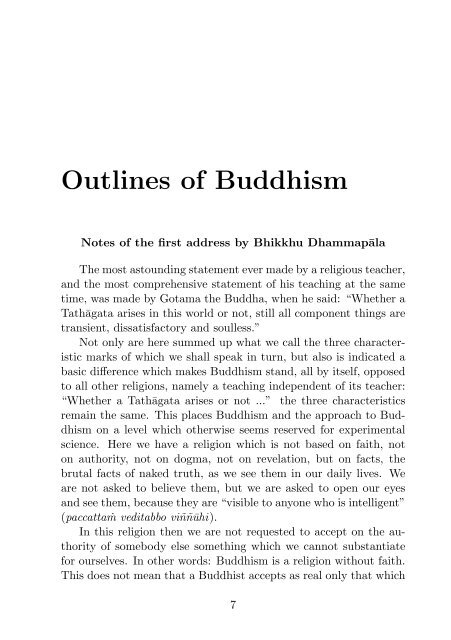Towards the Truth
Notes from a three-day debate in the 1940’s about Buddhism and Christianity.
Notes from a three-day debate in the 1940’s about Buddhism and Christianity.
Create successful ePaper yourself
Turn your PDF publications into a flip-book with our unique Google optimized e-Paper software.
Outlines of Buddhism<br />
Notes of <strong>the</strong> first address by Bhikkhu Dhammapāla<br />
The most astounding statement ever made by a religious teacher,<br />
and <strong>the</strong> most comprehensive statement of his teaching at <strong>the</strong> same<br />
time, was made by Gotama <strong>the</strong> Buddha, when he said: “Whe<strong>the</strong>r a<br />
Tathāgata arises in this world or not, still all component things are<br />
transient, dissatisfactory and soulless.”<br />
Not only are here summed up what we call <strong>the</strong> three characteristic<br />
marks of which we shall speak in turn, but also is indicated a<br />
basic difference which makes Buddhism stand, all by itself, opposed<br />
to all o<strong>the</strong>r religions, namely a teaching independent of its teacher:<br />
“Whe<strong>the</strong>r a Tathāgata arises or not ...” <strong>the</strong> three characteristics<br />
remain <strong>the</strong> same. This places Buddhism and <strong>the</strong> approach to Buddhism<br />
on a level which o<strong>the</strong>rwise seems reserved for experimental<br />
science. Here we have a religion which is not based on faith, not<br />
on authority, not on dogma, not on revelation, but on facts, <strong>the</strong><br />
brutal facts of naked truth, as we see <strong>the</strong>m in our daily lives. We<br />
are not asked to believe <strong>the</strong>m, but we are asked to open our eyes<br />
and see <strong>the</strong>m, because <strong>the</strong>y are “visible to anyone who is intelligent”<br />
(paccattaṁ veditabbo viññūhi).<br />
In this religion <strong>the</strong>n we are not requested to accept on <strong>the</strong> authority<br />
of somebody else something which we cannot substantiate<br />
for ourselves. In o<strong>the</strong>r words: Buddhism is a religion without faith.<br />
This does not mean that a Buddhist accepts as real only that which<br />
7
















